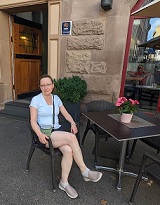Characterizing large cardinals via abstract logics
This is a talk at the Boise extravaganza in set theory,
University of Boise, June 17, 2021 (virtual).
Slides
Abstract: First-order logic, the commonly accepted formal system underlying mathematics, must draw however minimally on the properties of the set-theoretic universe in which it is defined. Stronger logics such as infinitary logics and second-order logics require access to much larger chunks of the set-theoretic background. Niceness properties of these logics, such as forms of compactness, are naturally connected to the existence of large cardinals. Indeed, many large cardinals can be characterized in terms of compactness properties of strong logics. Strongly compact and weakly compact cardinals $\kappa$ are precisely the strong and weak compactness cardinals respectively for the infinitary logic $\mathbb L_{\kappa,\kappa}$. Extendible cardinals $\kappa$ are precisely the strong compactness cardinals for the infinitary second-order logic $\mathbb L^2_{\kappa,\kappa}$. Vopenka's Principle holds if and only if every logic has a strong compactness cardinal. In this talk I will review properties of various logics and how their compactness properties characterize various large cardinals. I will discuss joint work with Will Boney, Stamatis Dimopolous and Menachem Magidor in which we show that the principle ${\rm Ord}$ is subtle, in the presence of global choice, holds if and only if every logic has a stationary class of weak compactness cardinal, i.e., it is the analogue of Vopenka's Principle for weak compactness. We also provide characterizations of the various virtual large cardinals using a new notion of a pseudo-model of a theory.
